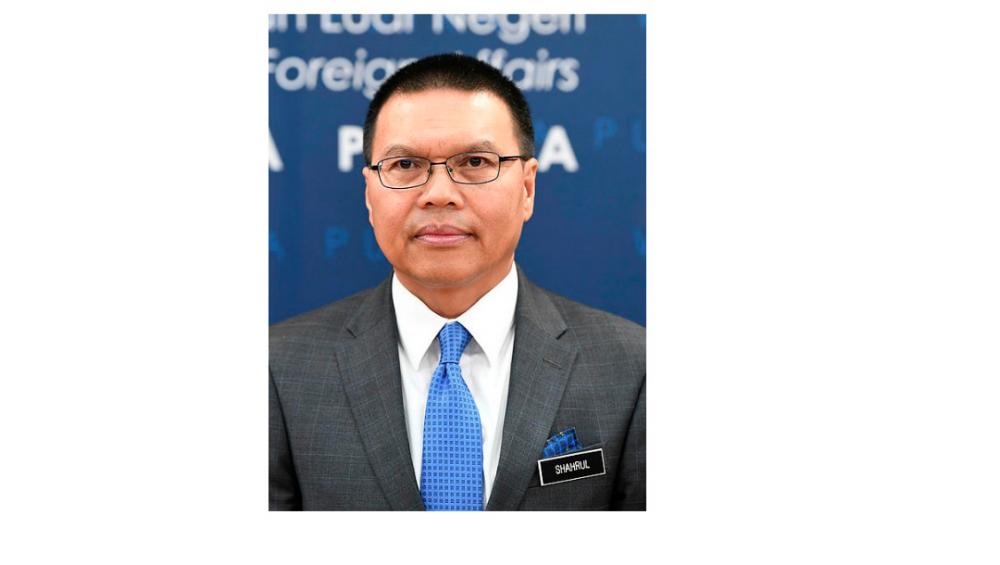PUTRAJAYA: As Asean marks Asean Day today, the 52nd anniversary of its founding in 1967, Malaysia has expressed the desire to see an increase in intra-Asean trade, saying it will contribute to the well-being of the people.
Foreign Ministry secretary-general Datuk Seri Muhammad Shahrul Ikram Yaakob (pix), in a statement on the occasion of Asean Day, said Malaysia will also like Asean to advance the Asean single market agenda for free flow of goods, services, and investments, as well as freer flow of capital and skills as the Asean Economic Community (AEC) 2025 envisions.
“This will allow Asean to make full use of its 640 million population, which has a combined market of US$2.3 million (RM 9.6 million),“ he said.
Muhammad Shahrul said that this year, Thailand, as the Asean chairman, set the theme of ‘Advancing Partnerships for Sustainability’ and a notable outcome was the launching of the Asean Centre for Sustainable Development Studies and Dialogue in Thailand this year, which will provide strong momentum to promote sustainable development cooperation in the region.
“Malaysia is fully supportive of Thailand’s chairmanship theme. Malaysia has embarked on the sustainability initiatives in line with the 11th Malaysia Plan. Malaysia will continue to contribute to global sustainable initiatives by incorporating elements of sustainable development into national policy and strategies,“ he said.
Muhammad Shahrul said sustainable development is a cross-cutting issue and covers broad sectors, hence coordination among ministries, government agencies as well as the private sectors and local communities is crucial.
“We are on the right track towards achieving the national development agenda and the global 2030 Agenda for Sustainable Development,“ he said.
He said there is also a need for Asean to actively engage all stakeholders, including the parliamentarians, business community, youth groups, representatives of civil society organisations (CSOs) and non-governmental organisations (NGOs).
“Proactive engagement with these stakeholders will allow the government to have a better understanding of pertinent issues in many different perspectives. It helps to dispel any notion that Asean only belongs to the political elites,“ he added.
Muhammad Shahrul said Malaysia’s Foreign Ministry is always ready to engage with all stakeholders in order to receive their feedback in the effort to strengthen the collaboration among all interested parties vis-à-vis Asean Community building efforts.
“In conclusion, though the future will undoubtedly present challenges which will further test Asean’s resilience and adaptability, I have every confidence that Asean will rise to the occasion together and will continue to transform the region to serve its citizens.
“Building the Asean Community that we envision will not happen overnight. But Asean’s history of close and extensive cooperation gives us the best possible opportunity for us to achieve Asean Vision 2025,“ he added.
Asean was established 52 years ago and has today evolved into a reputable regional organisation contributing to regional peace, security and stability.
This was achieved through strategic cooperation with its 10 dialogue partners as well as through the establishment of Asean-led mechanisms such as the Asean Regional Forum (ARF) in 1994, the Asean Plus Three (APT) in 1997 and the East Asia Summit (EAS) in 2005.
Muhammad Shahrul said uncertainties continue to swirl around the world with rapid changes in the international geopolitical landscape and trade relations, as well as security threats such as terrorism and transnational crime, and economic challenges as a result of unilateralism and protectionism mean that regional cooperation and integration are more important than ever.
“In Asean, we are guided by the principles of mutual respect, non-interference in the internal affairs of one another, and peaceful resolution of disputes based on international law and the principles of the Asean Charter.
“Asean external relations have deepened and widened. Asean has been working closely with its external partners through implementation of cooperation activities that have served the region well and contributed to global peace and prosperity,“ he said.
According to Muhammad Shahrul, the recent adoption of the Asean Outlook on the Indo-Pacific by the leaders at the 34th Asean Summit in June 2019 is a clear manifestation of our Asean way of maintaining Asean centrality as the underlying principle for promoting cooperation in the Indo-Pacific region.
He said this comprised four areas of cooperation, namely maritime, connectivity, the 2030 United Nations Agenda for Sustainable Development and the economy, and the outlook will serve as the guideline for Asean’s future actions amid changing global geopolitics. — Bernama













